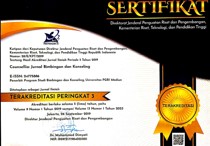Solution-Focused Brief Therapy (SFBT) untuk meningkatkan motivasi membaca Murid Disleksia
Abstract
Di Indonesia, prevalensi murid disleksia adalah 1% dari populasi murid sekolah dasar. Artinya, dari 50 juta murid, diperkirakan ada 5 juta murid yang mengalami disleksia. Disleksia adalah masalah kesulitan membaca yang terjadi pada anak-anak dengan penglihatan dan intelektual normal. Karena kesulitannya dalam membaca, murid disleksia cenderung memiliki motivasi membaca yang rendah. Motivasi membaca merupakan sebuah masalah besar yang akan menghambat pencapaian akademik, dan harus segera diselesaikan.. Solution-Focused Brief Therapy bisa menjadi alternatif penyelesaian masalah motivasi membaca yang dialami siswa disleksia sehingga mereka mampu berprestasi secara akademik, sesuai dengan kemampuan intelektual yang dimiliki. Oleh sebab itu, penelitian bertujuan untuk mengetahui seberapa besar efek Solution-Focused Brief Therapy (SFBT) dalam meningkatkan motivasi membaca murid disleksia. Penelitian ini menggunakan desain kuasi eksperimen dengan Non Equivalent Control Group Design yang melibatkan 16 orang murid kelas tinggi pada salah satu sekolah dasar di Aceh Utara, Aceh, Indonesia yang berkemungkinan mengalami masalah disleksia. Untuk menentukan kemungkinan murid mengalami disleksia, digunakan instrumen Senarai Semak Disleksia yang disusun oleh Kementerian Pelajaran Malaysia (KPM) dan Universiti Sains Malaysia (USM). Motivasi membaca ditentukan oleh skor Motivation to Read Profile (MRP). Hasil penelitian menunjukkan bahwa terdapat peningkatan skor motivasi membaca murid yang telah mengikuti intervensi SFBT selama enam sesi, sebesar 106 poin, dengan size effect 1.181 yang berarti bahwa SFBT yang diberikan memberikan efek yang besar dalam meningkatkan motivasi membaca murid disleksia.
Abstract :There are 15% of elementary school students in the world are dyslexic. Dyslexia is a reading difficulty that occurs in children with normal vision and intellect. Dyslexic students certainly have reading motivation problems. Reading motivation is a big problem that will effect to academic achievement, and must be resolved immediately. Solution-Focused Brief Therapy (SFBT) can be an alternative to increase the reading motivationof dyslexic students, so that they can achieve according to their intellectual abilities. Therefore, this study aims tp find out how much the effect of Solution-Focused Brief Therapy (SFBT) in increasing the reading motivation of dyslexic students. This study uses a quasi-experimental design with Non Equivalent Control Group Design, involving 16 high class students in one of the elementary schools in North Aceh, Aceh, Indonesia who are likely to experience dyslexia problems. To determine the possibility of dyslexia, researchers used the dyslexic checklist instrument compiled by the Malaysian Ministry of Education (KPM) and Universiti Sains Malaysia (USM). The level of reading motivation is determined by the Motivation to Read Profile (MRP) score. The results showed that there was an increase in the reading motivation score of students who had followed SFBT interventions for six sessions, totaling 106 points, with a size effect of 1.181 which meant the given SFBT had a great effect in increasing the reading motivation of dyslexic students.
Keywords
Full Text:
PDFReferences
Altamimi, R. (2016). Understanding Dyslexia (University of Exeter). Retrieved from https://pdfs.semanticscholar.org/ff4f/2cd4c8ae965f765bba576f556897c156b00b.pdf
American Psychiatric Association. (2015). Supplement To Diagnostic and Statistical Manual of Mental Disorders. In Diagnostic and Statistical Manual of Mental Disorders (5th ed.).
Armenta, J. M. (2010). Dyslexia, dysgraphia, and dyscalculia (pp. 1–2). pp. 1–2. Armenta Learning Academy.
Bozeman, B. (2000). The efficacy of solution-focused therapy techniques on perception of hope in clients with depressive symptoms. In Unpublished Doctoral Dissertation. New Orleans. IA.
Bull, L. (2003). The Use of Support Groups by Parents of Children with Dyslexia. Early Child Development and Care, 173(2–3), 341–347. https://doi.org/10.1080/0300443031000071923
Cohen, L., Manion, L., & Morrison, K. (2012). Research methods in education. In Professional Development in Education (Sixth, Vol. 38). https://doi.org/10.1080/19415257.2011.643130
Daki, J. (2008). Solution Focused Brief Therapy: Addressing Academic, Motivational, Social and Emotional Difficulties of Older Children with Reading Deficits. McGill University, Montreal.
Daki, J., & Savage, R. S. (2010). Solution-Focused Brief Therapy : Impacts on Academic and Emotional Difficulties. The Journal of Educational Research, 103, 309–326. https://doi.org/10.1080/00220670903383127
Dewi, K. (2015). Disleksia. Prosiding Seminar Nasional PGSD UPY, 7–13. Retrieved from http://repository.upy.ac.id/407/1/artikel kristiantini.pdf
Fitriyah, F. K. (2018). Reducing Aggressive Behavior Using Solution-Focused Brief Counseling (Sfbc). JBKI (Jurnal Bimbingan Konseling Indonesia), 2(2), 34–39.
Fraenkel, J. R., & Wallen, N. E. (2003). How to Design and Evaluate Research in Education (5th ed.). New York: McGraw-Hill.
Kaharja, & Latipah, E. (2016). Pengaruh Konseling Islami Solution Focused Brief Therapy terhadap Self-Esteem Siswa MTsN Bantul Kota Tahun 2015/2016. Jurnal Pendidikan Agama Islam, 13(1), 99–116.
Kementerian Pelajaran Malaysia. (2011). Instrumen Senarai Semak Disleksia (ISD) (2nd ed.). Malaysia: Kementerian Pelajaran Malaysia.
Kim, J. S., & Franklin, C. (2009). Solution-focused brief therapy in schools: A review of the outcome literature. Children and Youth Services Review, 31(4), 464–470. https://doi.org/10.1016/j.childyouth.2008.10.002
Latif, S., & Musfirah, M. (2019). Model Hipotetik: Pendekatan Solution-Focused Brief Counseling (SFBC) dalam Keluarga. Indonesian Journal of Educational Counseling, 3(1), 11–20. https://doi.org/10.30653/001.201931.81
Malloy, J. A., Marinak, B. A., Gambrell, L. B., & Mazzoni, S. A. (2013). Assessing motivation to read: The motivation to read profile-revised. Reading Teacher, 67(4), 273–282. https://doi.org/10.1002/trtr.1215
Mckergow, M., & Korman, H. (2009). Inbetween-Neither Inside Nor Outside: The Radical Simplicity of Solution-Focused Brief Therapy. Journal of Systematic Therapies, 28(2), 34–49.
Nugroho, A. H., Puspita, D. A., & Mulawarman. (2018). Penerapan Solution-Focused Brief Counseling (SFBC) untuk Meningkatkan Konsep Diri Akademik Siswa. Bikotetik (Bimbingan Dan Konseling: Teori Dan Praktik), 2(1), 73–114. https://doi.org/10.26740/bikotetik.v2n1.p93-99
Polychroni, F., Koukoura, K., & Anagnostou, I. (2006). Academic self-concept, reading attitudes and approaches to learning of children with dyslexia: do they differ from their peers? European Journal of Special Needs Education, 21(4), 415–430. https://doi.org/10.1080/08856250600956311
Roeden, J. M., Maaskant, M. A., & Curfs, L. M. G. (2014). Processes and effects of solution-focused brief therapy in people with intellectual disabilities: A controlled study. Journal of Intellectual Disability Research, 58(4), 307–320. https://doi.org/10.1111/jir.12038
Rusandi, M. A., & Rachman, A. (2014). Keefektifan Solution Focused Group Counseling untuk meningkatkan Planned Happenstance Skills dan Career Decision Self Efficacy Mahasiswa BK FKIP Universitas Lambung Mangkurat Banjarmasin. Al ‘Ulum, 62(4), 22–28.
Rusandi, M. A., Sugiharto, D. Y. P., & Sunawan, S. (2019). Effectiveness of solution-focused group counseling to improve planned happenstance skills of student. Jurnal Konseling Dan Pendidikan, 7(1), 30. https://doi.org/10.29210/127600
Saffarpoor, S., Farahbakhsh, K., Shafiabadi, A., & Pashasharifi, H. (2011). The Effectiveness of Solution-Focused Brief Therapy on Increasing Social Adjustment of Female Students Residing in Tehran University Dormitories. International Journal of Psychology and Counselling, 3(2), 24–28. Retrieved from http://academicjournals.org/IJPC/PDF/Pdf2011/Feb/Saffarpoor et al.pdf
Smith, D. M. (2011). Readers Theatre: Its Effectiveness in Improving Reading Fluency, Student Motivation, and Attitudes Toward Reading Among Second-Grade Students. The Pennsylvania State University.
Smith, S. (2010). A Preliminary Analysis of Narratives on the Impact of Training in Solution-Focused Therapy Expressed by Students Having Completed a 6-month Training Course. Journal of Psychiatric and Mental Health Nursing, 17, 105–110. https://doi.org/10.1111/j.1365-2850.2009.01492.x
Sumarwiyah, S., Zamroni, E., & Hidayati, R. (2015). Solution Focused Brief Counseling (Sfbc): Alternatif Pendekatan Dalam Konseling Keluarga. Jurnal Konseling Gusjigang, 1(2). https://doi.org/10.24176/jkg.v1i2.409
Texas Education Agency. (2018). The Dyslexia Handbook: Procedures Concerning Dyslexia and Related Disorders. Retrieved from https://throck.socs.net/vimages/shared/vnews/stories/48ce762e8414b/2018-Dyslexia-Handbook_Approved_Accomodated_12_11_2018 %282%29.pdf
Trepper, T. S., & Mccollum, E. E. (2010). Solution Focused Therapy Treatment Manual for Working with Individuals Research Committee of the Solution Focused Brief Therapy Association 2010.
Woods, K., Bond, C., Humphrey, N., Symes, W., & Green, L. (2011). Systematic Review of Solution Focused Brief Therapy (SFBT) with Children and Families. University of Manchester.
Article Metrics
Abstract has been read : 3403 timesPDF file viewed/downloaded: 0 times
DOI: http://doi.org/10.25273/counsellia.v10i1.5213
Refbacks
- There are currently no refbacks.
Counsellia is Indexed By:
Counsellia Office:
Universitas PGRI Madiun
Program Studi Bimbingan dan Konseling

This work is licensed under a Creative Commons Attribution-NonCommercial-ShareAlike 4.0 International License.














